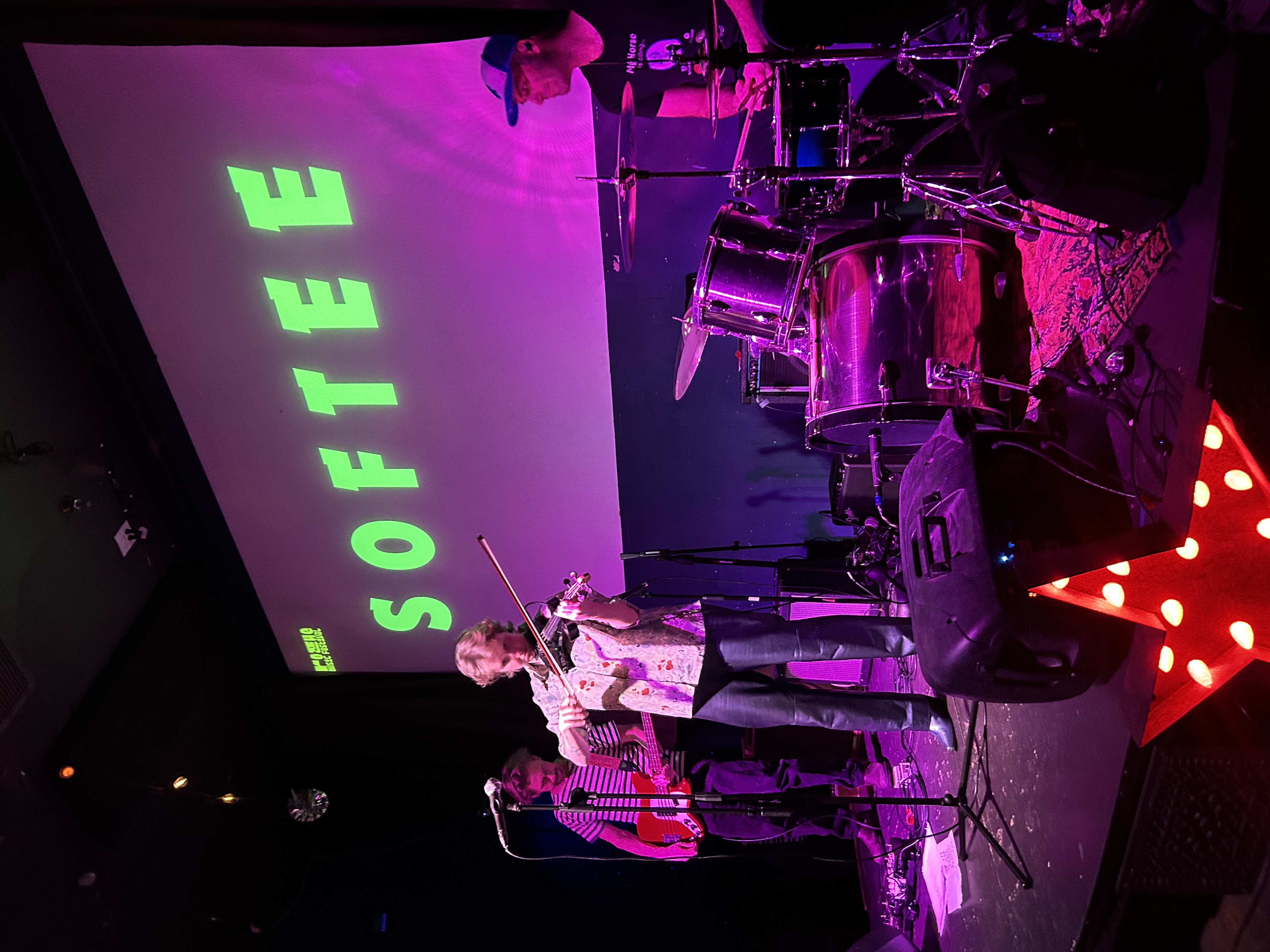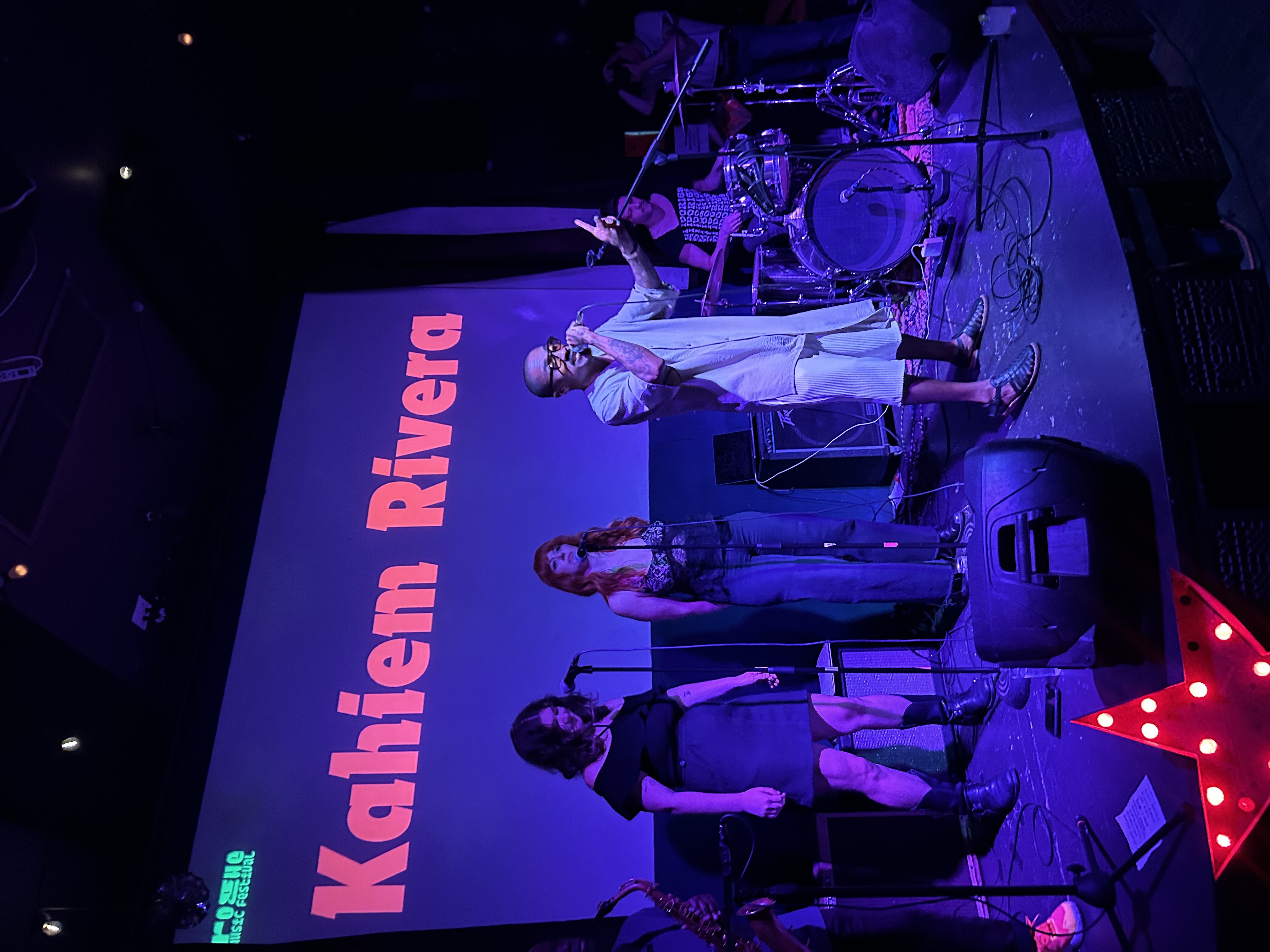
Softee performing at Rogue Music Festival. All photos by Layla Passman.
Cynicism and Hope at Rogue Music Festival
Even if just for three days, the Festival spotlights local musicians who have long been overlooked and underpaid.
By Layla Passman
09.12.2024
My friends and I have ironically named the strip of Wyckoff Ave off the Jefferson L stop “downtown Bushwick” for its overcrowded clubs, neon lights, and street vendors. I pass the elaborate outdoor dining setups and walk through clouds of bad EDM music and fake weed trucks. It feels like a contrived destination for partying, making an Epcot version of the neighborhood.
I’m entering the tail-end of the three-day Rogue Music Festival, a local festival aiming to compensate local artists fairly by eliminating high door fees and adopting a 70/30 ticket sale split. Rogue focuses their bills on queer and BIPOC artists, bringing a range of musicality to Starr Bar’s stage.
I’ve passed Starr Barr so many times that entering feels off-limits at this point. Walking up the stairs, I’m greeted by a heavy smattering of men in Hawaiian shirts. I count about 10 too many. The bar is decorated with signs that said “no fossil fuel money” and “Occupy Wall Street,” as if the bar had the opportunity to be funded by an oil company, but refused due to moral conviction. Soon enough, the next band is called to start, a perfect way out to my conversation with one of the Hawaiian-shirted men at the bar.
Di Ivories is an upbeat five-piece led by Diego, the keyboard player who stands outside the stage, level with the audience. The room in the back of Starr Bar is small but makes up for it in sound quality heard by a small group of loving friends. Diego jumps up and down while singing and playing simultaneously. Behind them is a meek synth player, drums, guitar, and a bass held neck-high to the chest. Between songs, Diego makes gracious platitudes about getting where you need to be as the rest of the band talks to each other while onstage, knowingly pretending the audience isn’t there watching. Di Ivories’s music is easy. There is nothing offensive about it, like people who are only described as nice. The next song is about falling in love with someone in a different time zone, Diego explains, which prompts knowing giggles from the room, the type of laugh that comes from Millennials with over a decade of defunct internet relationships. The crowd jumps around for the next few songs as the lead singer staggers between singing in English and Spanish. Over the music, I hear a woman bragging to her friend about how much caffeine she drank that day.

Di Ivories performing at Rogue Music Festival.
After the set, one of the festival’s creators took the time to shout out the incense vendors and raffle prizes. Then, the next act—Softee—sets up. Coming in with no previous knowledge, I am immediately shocked by the talent onstage. Softee is a project by Nina Ross, who looks unassuming in a button-down and modest haircut. Backed up by a drummer, bassist, and synth tracks, Ross brings a powerful voice with just the right amount of soul and earnestness. After a few tracks, they start playing the electric violin, creating pop music that feels vulnerable and authentic. They sing about having a crush on your boss, about being the “crazy one” in the relationship, all with their head held so high that I can hear the wows from the audience. Ross moves forward like a strong gust of wind, dancing with the microphone stand, even using it as a pantomimed penis like a male comedian would. They point out their coworkers eagerly screaming through the whole set and continue energizing the crowd with belting notes and violin solos. Softee produces all their own music, blending classic pop beats with an enthusiasm not often captured on such a small stage. For the final song, Ross brings out their friend Colby Lewis to rap, creating a celebratory atmosphere, even though the person sitting next to me is asleep.
At this point in the night, my exhaustion is overtaking me too. I eat a plate of soggy french fries and check out the snare drum they’re raffling off. Kahiem Rivera begins his set shortly after, trying to come back from an hour-long schedule delay due to a late start and slow changeovers. Joined by drums, backup singers, and a saxophone, Rivera starts rapping and singing, bringing a new R&B energy to the festival. He sings with a dark autotune effect, making him sound like he just huffed keyboard cleaner. The backup singers echo Rivera, voices bouncing back and forth from right to left. While Rivera keeps the pace of classic rap music, his lyrics are inventive and experimental. With voice effects, saxophone, and doomy beats, Rivera has the audience nodding along, and I gloomily watch someone do the robot.

Kahiem Rivera performing at Rogue Music Festival.
After a poor showing for the raffle items, Cassie Ramone—the final act of the night—takes the stage. Ramone looks visibly nervous for someone who is a part of Brooklyn music history, being one-third of the influential band Vivian Girls in the early 2000s. The band broke up in 2014, the same year Vice commandeered the DIY music spaces on Kent Avenue for their offices. After a lengthy setup of multicolored string lights and an amplified acoustic guitar, Ramone is ready to play. The crowd has thinned late into Sunday night, and Cassie asks for everyone to sit on the floor. I keep my spot at a booth in the back, hoping to be lulled like a baby before bedtime. Ramone has a big bow in her hair and wears suspender tights and a floral dress, an ensemble right out of a twee Pinterest board. Alongside her is an electric guitarist and backing tracks that frame the simplicity of her songs. Although Malone has been making music for years, I can feel the sacredness of her voice, as if she were still writing in her teenage bedroom. Her sound is referential to her past, bringing the frank earnestness from early 2000s Williamsburg into today’s music world, reminding everyone of how much they’ve grown up.

Cassie Ramone performing at Rogue Music Festival.
Even if just for three days, the Rogue Music Festival shows a new approach to spotlight local musicians who have long been overlooked and underpaid. The fun feels like a well-planned corporate retreat at times; the effort is palpable. But it needs to be if you’re trying to rewire decades of artist mistreatment into three days’ worth of shows. Rogue creates an environment where artists feel central, whether monetarily or through the founder’s lengthy introductions to each act. I can’t help but think that maybe I’ve become the cynical one, while Millennials have been able to cling to hope for a new world. Even at the tail-end of the festivities, I feel this hope from many of the performers, and their comfort of being at the center of it all. There aren’t the frustration-painted egos I often see, or the poor door splits that leave artists with nothing. Instead, both the artists and showgoers are able to gain a new appreciation for live music.
